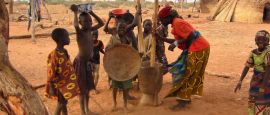Niger History, Language and Culture
History of Niger
Human settlement in Niger goes back 6,000 years, when what was a very fertile area supported a well-developed civilisation. In the thousand years up to the 19th century, power in the region was based on control of the great trans-Saharan trade routes, with the Hausa Kingdom dominating the area from the 13th century. This power decreased from the 18th century, as European traders reached West Africa by sea. Colonised in the late 19th century, Niger was part of the French Empire until independence in 1960.
Hamani Diori was elected the first head of state, and presided over a period of stability until severe drought in 1968 instigated widespread civil unrest. In April 1974, the army staged a coup under Seyni Kountché. A series of failed coups followed, but Kountché held on until his death in 1987. He was replaced by his staunch ally, Ali Saibou.
Saibou’s Mouvement Nationale pour une Société de Développement (MNSD) became the sole political party until the early 1990s, when Niger came under increasing pressure to reintroduce democracy. A National Assembly poll held in 1993 saw victory for the Alliance des Forces de Changement (AFC). The MNSD was also thwarted in the presidential election, which was won by Mahamane Ousmane of the AFC.
Following legislative elections in 1995, the MNSD recovered control of the national assembly under Cissé. Over the next year, friction between Cissé and Ousmane worsened until the military stepped in once again. Army chief of staff Ibrahim Bare Mainassara took control, but quickly restored a veneer of civilian government.
In April 1999, Mainassara was killed by his head of security. The uncertain political situation which followed was resolved with the holding of simultaneous presidential and legislative elections. The MNSD recovered control of both presidency and national assembly, where it forms the government with Hana Amadou as premier.
The sixth republic was formed in 2009 after constitutional changes to allow then president Mamadou Tandja to extent his tenure, before unrest lead to a further coup which returned the country to elections judged free and fair by the international community.
Did you know?
• Although Niger is sometimes called the frying pan of Africa, temperatures in the Sahara often drop below freezing at night.
• Slavery was only outlawed in 2004.
• Niger was home to the world’s most isolated tree. The next was 400km (250 miles) away.




 You know where
You know where